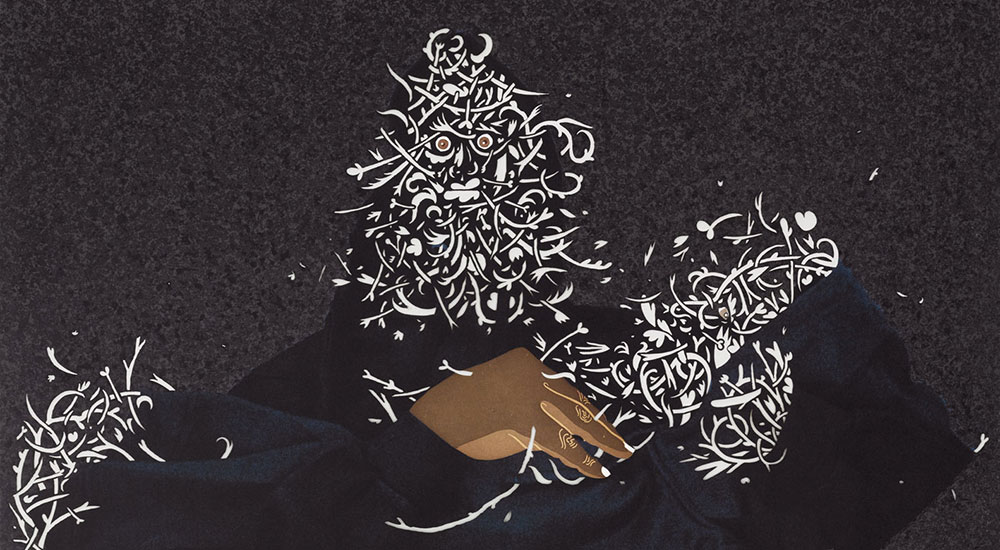
William Villalongo, Palimpsest, 2017.DETAIL. seven-run screenprint with laser cut areas and intaglio collage elements. 52 x 37 ½ in. Published by Graphicstudio, University of South Florida Collection.
CAM Antiracist Resources
USF Art Collection works that can support discussions and activities for antiracist work
Work by Black artists:
William Villalongo’s work addresses the perception of Black bodies, the cycle of violence, protest and erasure, the state of flux between visibility and invisibility, and resiliency.
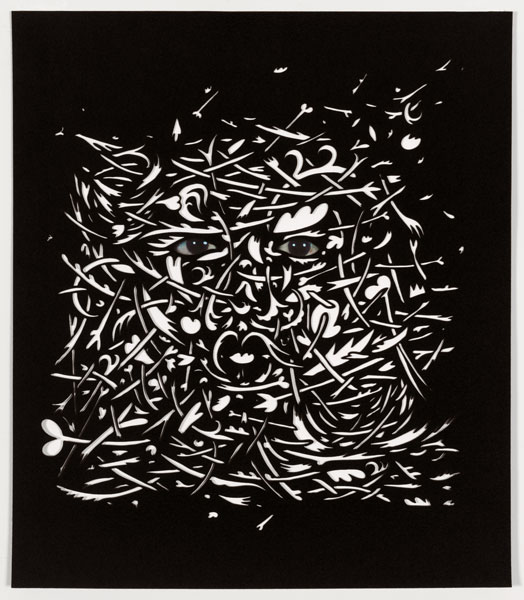
William Villalongo
Embodied, 2018
laser cut felt with archival pigment print
20 x 17-1/8 in.
Published by Graphicstudio, University of South Florida Collection
http://graphicstudio.usf.edu/GS/artists/villalongo_william/villalongo.html
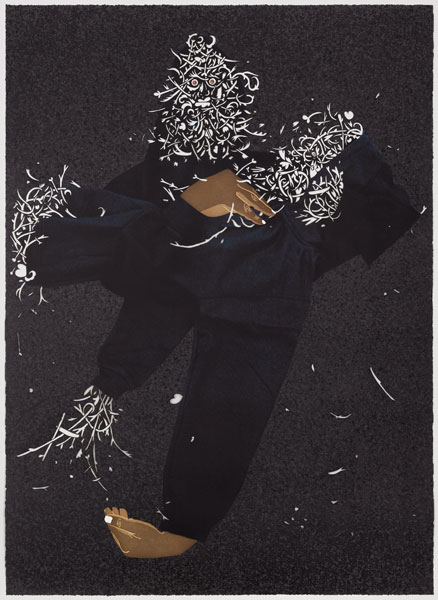
William Villalongo
Palimpsest, 2017
seven-run screenprint with laser cut areas and intaglio collage elements
52 x 37-1/2 in.
Published by Graphicstudio, University of South Florida Collection
http://graphicstudio.usf.edu/GS/artists/villalongo_william/villalongo.html
Lorna Simpson’s work combines images with text to explore society’s relationship with race, sex, and ethnicity. Her conceptual work invites the viewer to participate in the creation of their meaning while confronting the viewer with the underlying racism in American culture.
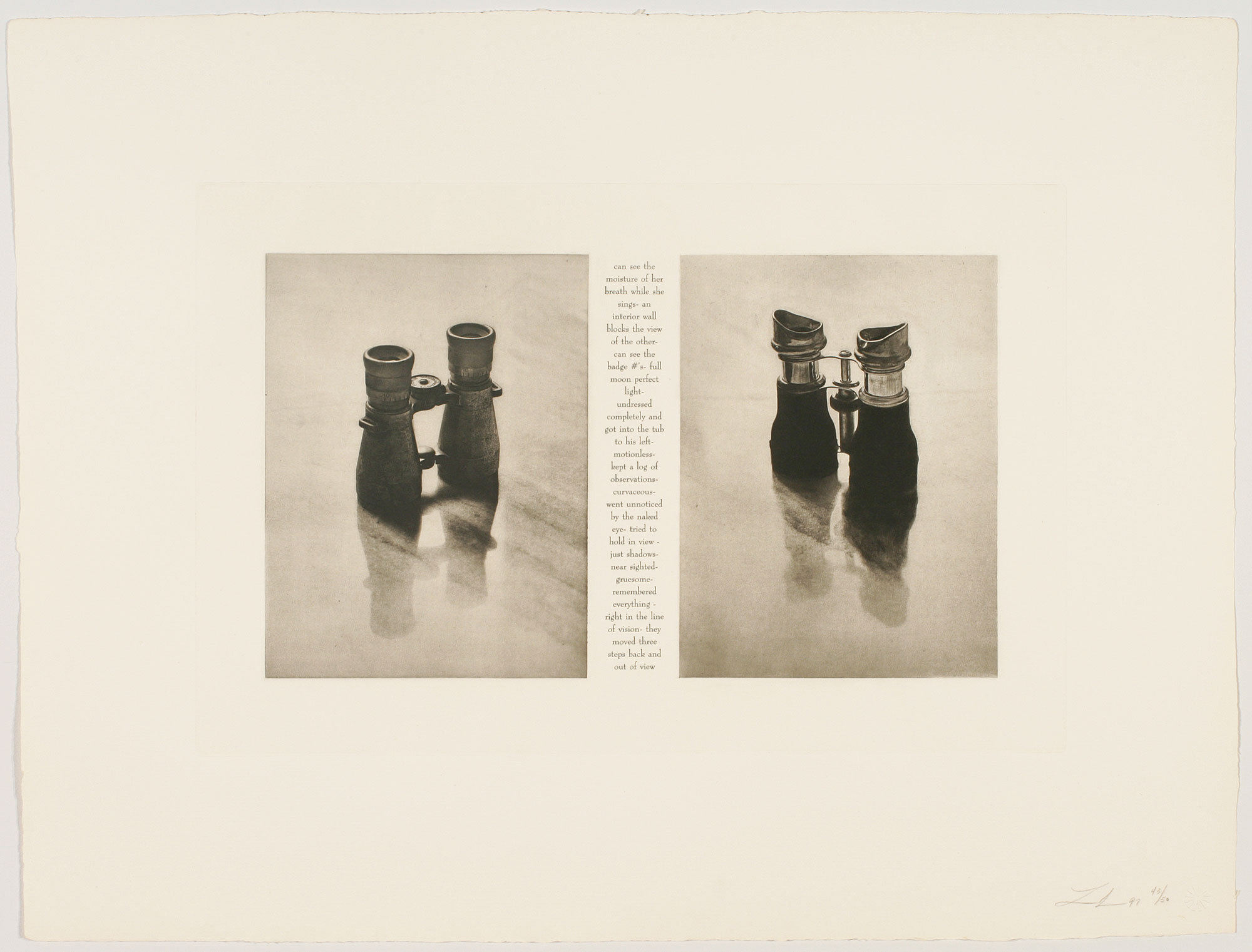
Lorna Simpson
Two Pairs, 1997
photogravure
20 x 26 in.
Published by Graphicstudio, University of South Florida Collection
http://graphicstudio.usf.edu/GS/artists/simpson_lorna/simpson.html
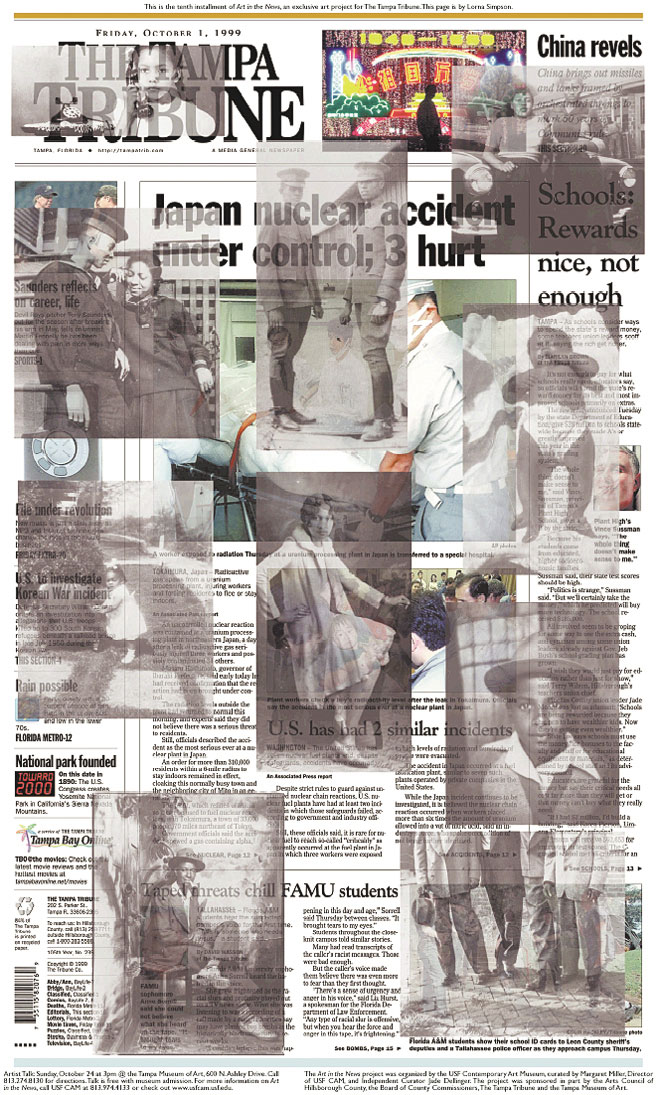
Lorna Simpson
Art in the News: Lorna Simpson, 1999
newspaper printing proof
21 x 12-1/2 in.
offset lithograph on newsprint
13-1/4 x 21-3/4 in.
USF Contemporary Art Museum Publication, University of South Florida Collection
http://cam.usf.edu/CAM/exhibitions/1999_01_ArtInTheNews/artinthenews.html
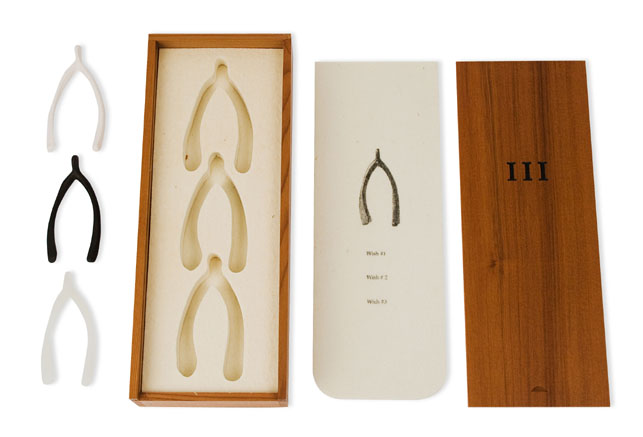
Lorna Simpson
III, Christmas Edition 1994, 1994
wood box and felt with ceramic, rubber, and bronze wishbones
13-5/8 x 5-3/8 x 2-1/8 in. (box dimensions)
Gift of the Norton Family, University of South Florida Collection
https://www.moma.org/explore/inside_out/2010/12/04/you-only-get-three-wishes/
https://www.arcanabooks.com/catalog/book/016361/
Romare Bearden’s collages and photomontages, made from torn images of popular magazines, depict aspects of Black culture and African American experience. His work shows influences of abstract art as well as patch-work quilts.
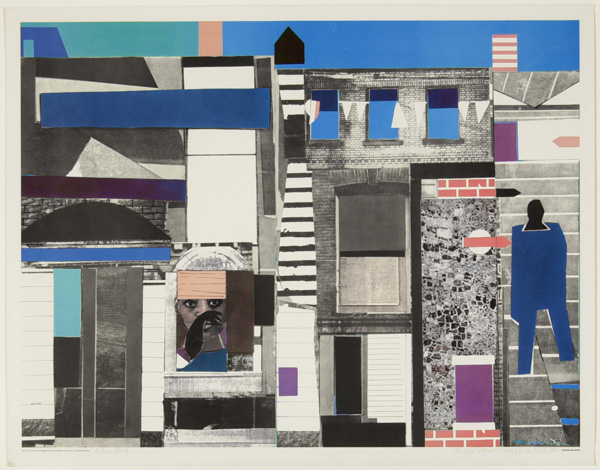
Romare Bearden
Ghetto, 1972
offset lithograph
28-3/4 in. x 35 in.
Gift of Mr. and Mrs. Kurt Olden, University of South Florida Collection
http://cam.usf.edu/CAM/cam_collection.html
[enter Bearden in the quick search window]
Kalup Linzy explores gender, sexuality, cultural identities, and family relationships. Linzy’s best-known work is a series of politically charged videos that satirize the conventions of the television soap opera.
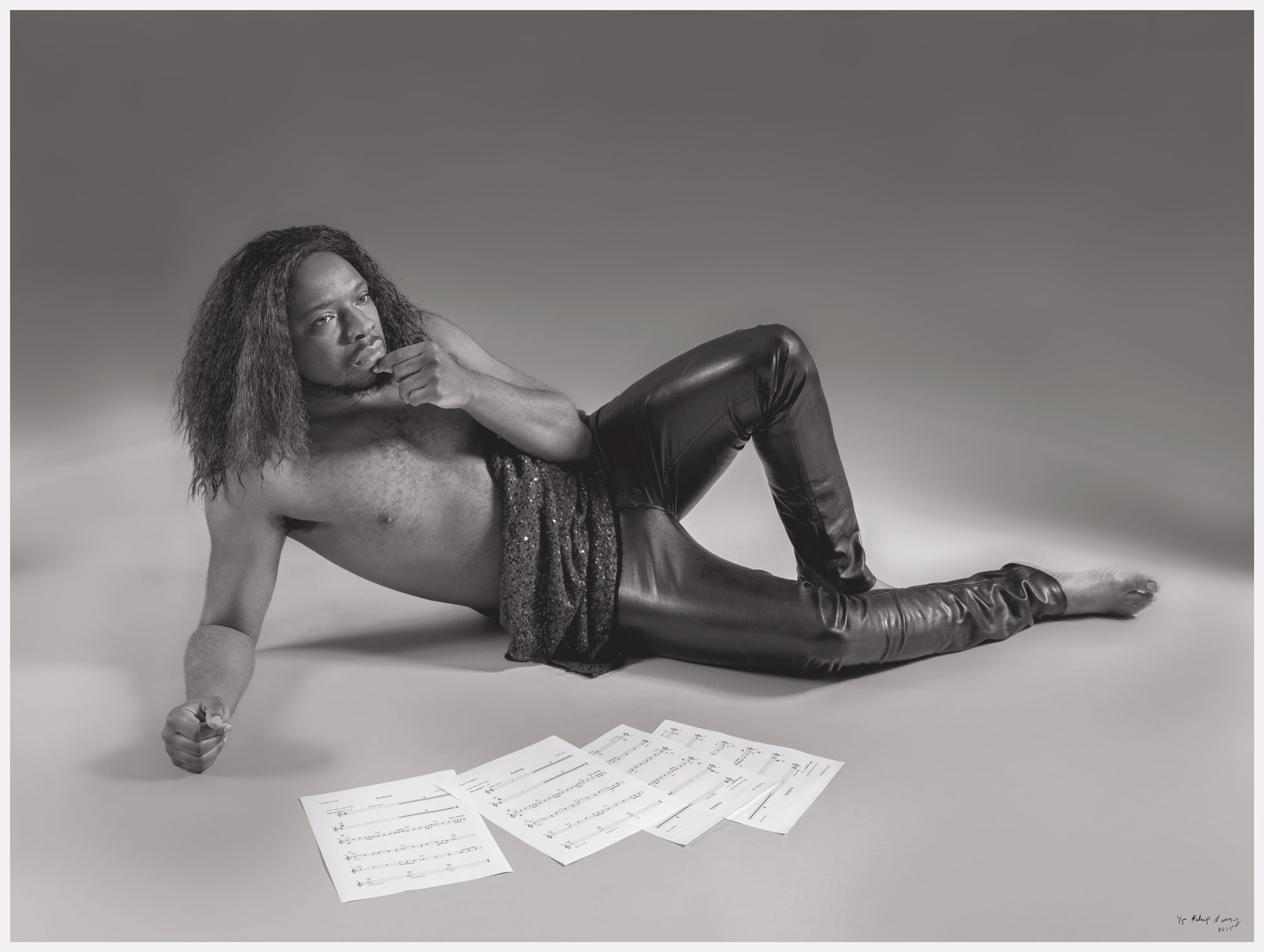
Kalup Linzy
Kaye Covers Asshole, 2015
archival pigment print
42 x 56 in.
Published by Graphicstudio, University of South Florida Collection
http://graphicstudio.usf.edu/GS/artists/linzy_kalup/linzy.html
Trenton Doyle Hancock has created a fantastical narrative that informs his prolific artistic output. These narratives explore good and evil, authority, race, moral relativism, and religion. Part fictional, part autobiographical, Hancock’s work pulls from his own personal experience, art historical canon, comics and superheroes, pulp fiction, and myriad pop culture references.
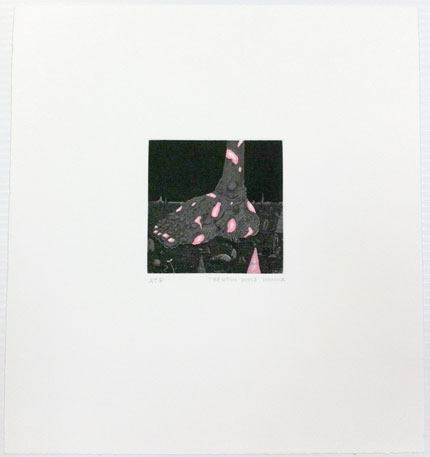
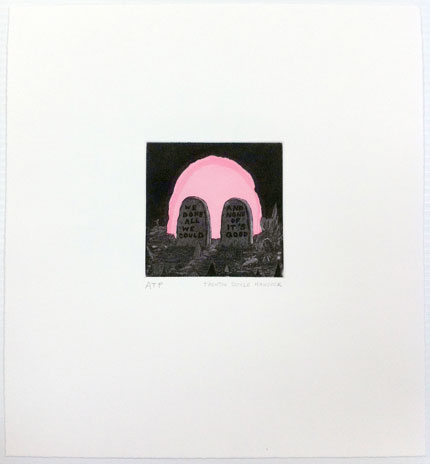
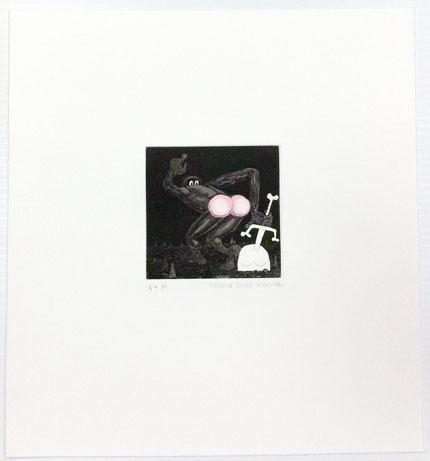
Trenton Doyle Hancock
The Night Foot, 2010
We Done All We Could And None Of It’s Good, A Nocturn, 2010
Like A Thief In The Night, 2010
Suite of three aquatint etchings
13-1/8 x 12 in.
Published by Graphicstudio, University of South Florida Collection
http://graphicstudio.usf.edu/GS/artists/hancock_trenton_doyle/hancock.html
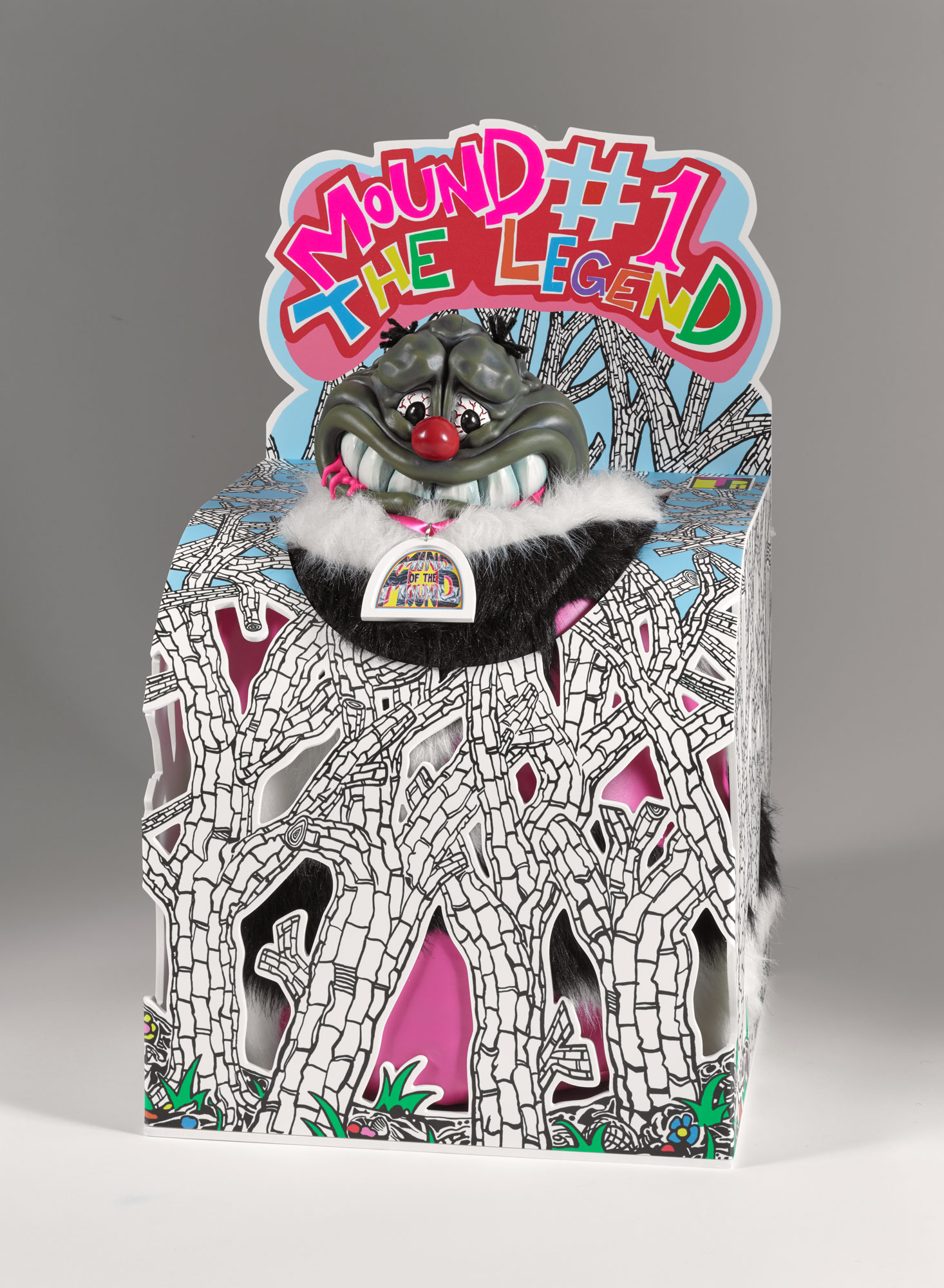
Trenton Doyle Hancock
Mound #1 the Legend, 2015
mixed media sculpture accompanied by an 8 x 8 inch acrylic painting on canvas
27 x 16 x 16 inches
[not currently in the USF Collection but USF Graphicstudio production and expected to be donated]
http://graphicstudio.usf.edu/GS/artists/hancock_trenton_doyle/hancock.html
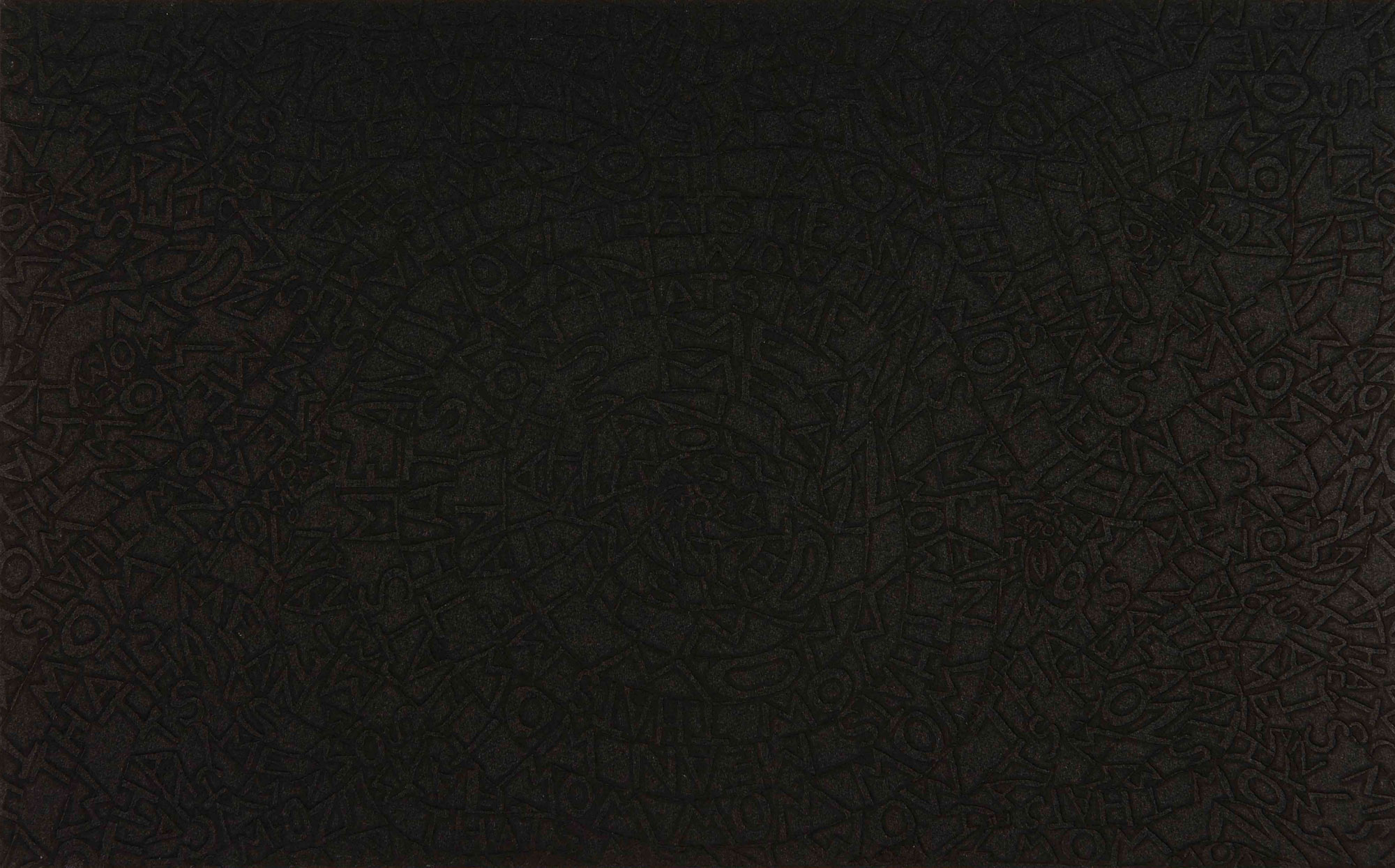
Trenton Doyle Hancock
Wow That's Mean, 2008
suite of four etchings on black paper with chine collé
Each: 10-1/2 x 14 in.
Published by Graphicstudio, University of South Florida Collection
http://graphicstudio.usf.edu/GS/artists/hancock_trenton_doyle/hancock.html
Work by an Indigenous artist:
Fiona Foley is an Indigenous Australian artist of the Badtjala people. Foley examines and dismantles historical stereotypes and explores themes of politics, culture, ownership, language and identity. She assumed the dress of peoples for other nations to confront stereotypes and expectations and to assert affiliations with international First Nation peoples. In Wild Times Call, she assumed American Seminole dress. The sepia photographs reference Edward Sheriff Curtis’ photographs of Native Americans (see Curtis photographs in the USF Collection below).
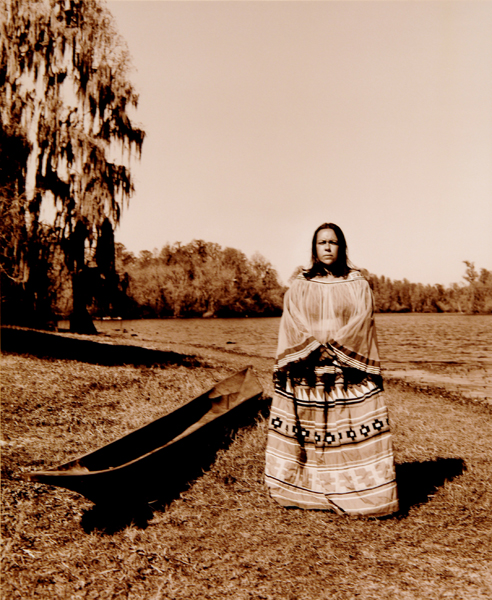
Fiona Foley
Wild Times Call (1-7), 2001
chromogenic prints
34 x 40-7/8 in.
Commissioned by the USF Contemporary Art Museum, University of South Florida Collection.
http://cam.usf.edu/CAM/cam_collection.html
[enter Foley in the quick search window]
Work by Latinx artists:
Graciela Iturbide’s photographs focus on the landscapes she has experienced in her extensive travel, and a search for one’s identity in the world.
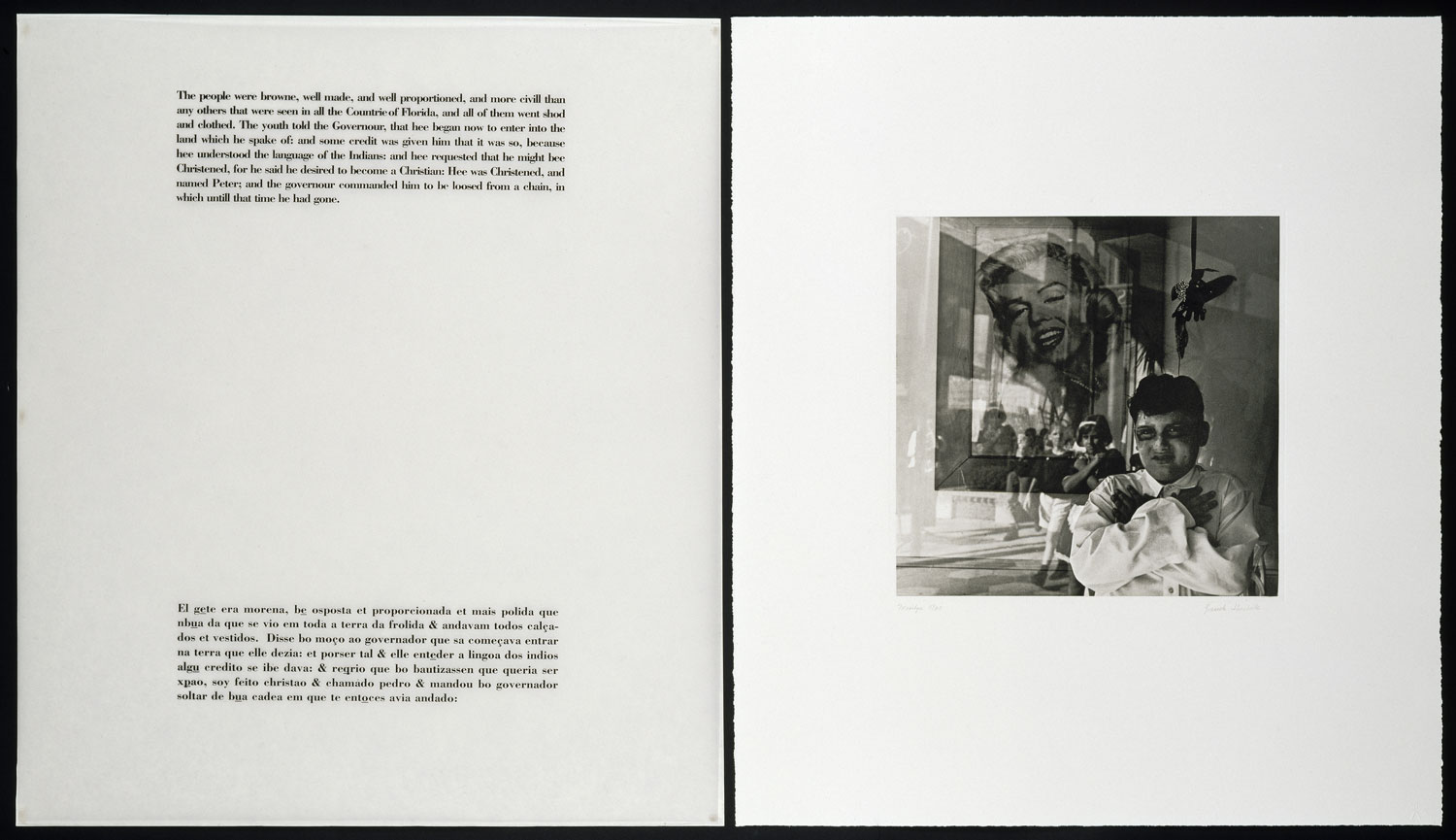
Graciela Iturbide
Espiritu Santo, 1996
portfolio of 6 photogravures of contemporary Florida with text from the first expedition of Hernan de Soto to Florida in 1553.
30 x 26-1/2 in.
Published by Graphicstudio, University of South Florida Collection
http://graphicstudio.usf.edu/GS/artists/iturbide_graciela/iturbide.htmlEspiritu Santo is a layering of image and history, as a present day Mexican woman meets a Spaniard of the sixteenth century, on Tampa Bay, the site of de Soto's first landing, which he christened "Espiritu Santo.”
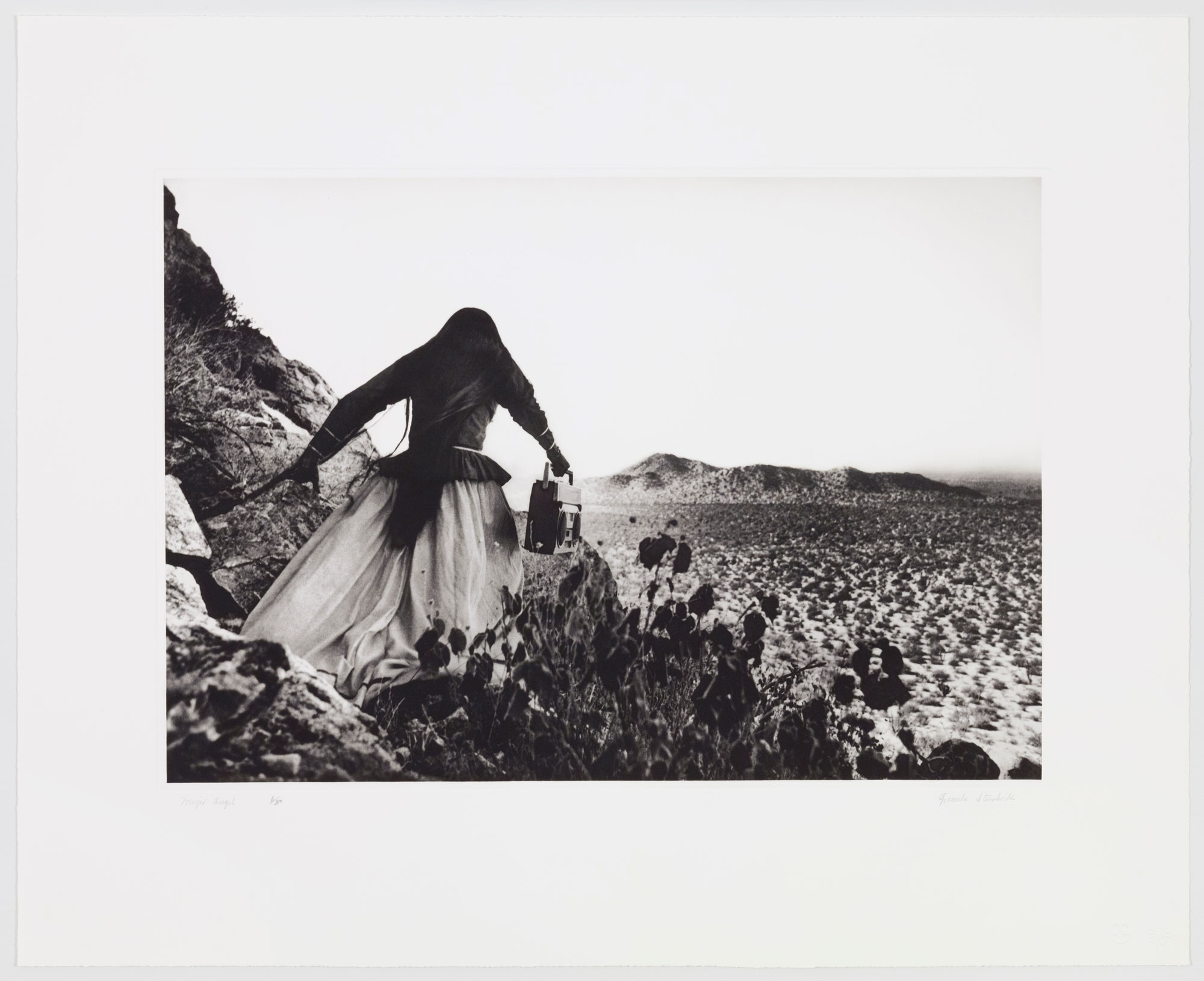
Graciela Iturbide
Mujer Angel, 1996
photogravure
26-1/8 x 32-1/4 in.
Published by Graphicstudio, University of South Florida Collection
http://graphicstudio.usf.edu/GS/artists/iturbide_graciela/iturbide.htmlIn 1978 Iturbide was commissioned by the Ethnographic Archive of the National Indigenous Institute of Mexico to photograph Mexico’s indigenous population. This image shows a Seri Indian woman in traditional dress walking into the Sonoran Desert, boom box in hand.
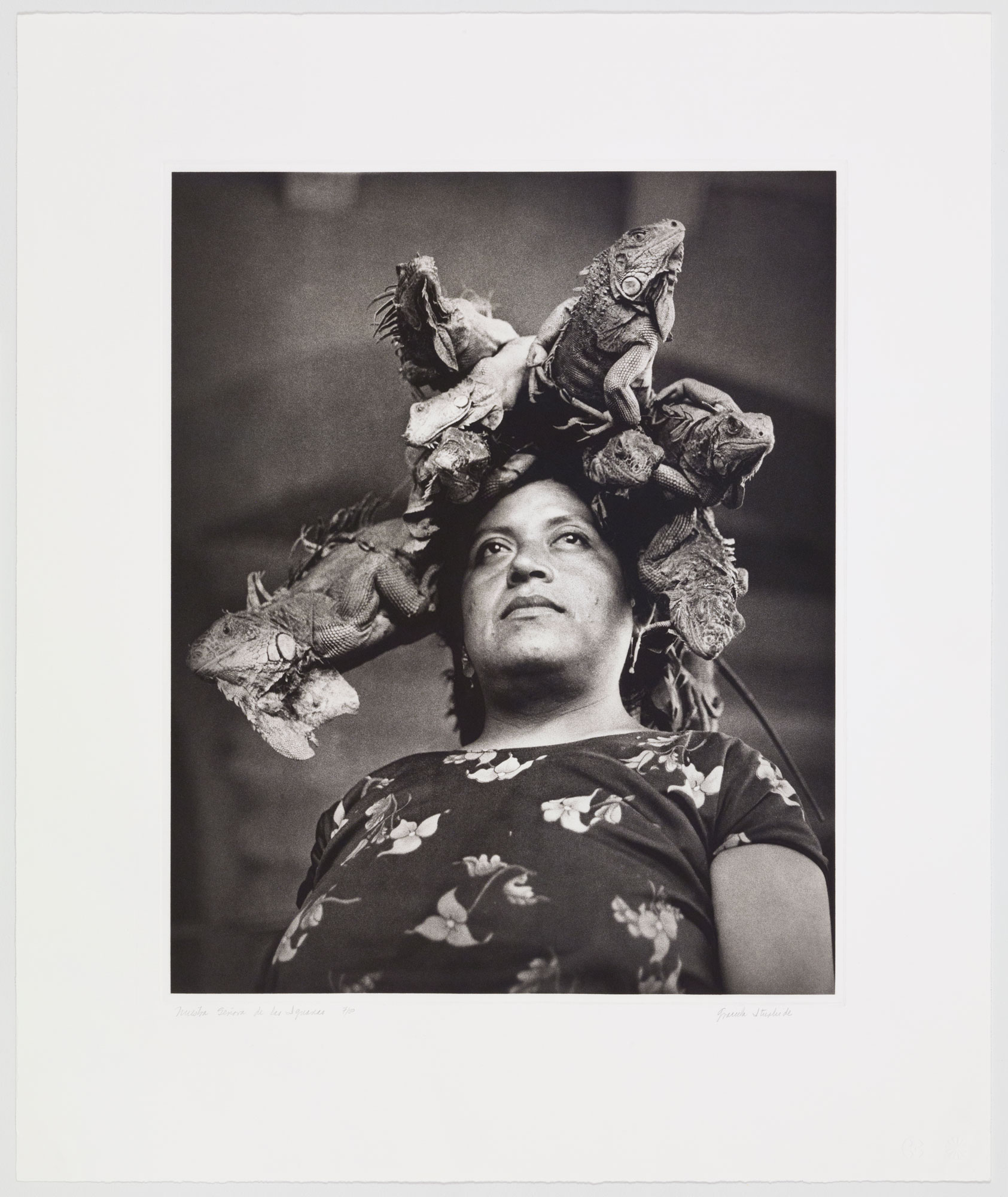
Graciela Iturbide
Nuestra Señora de las Iguanas, 1996
photogravure
29-7/8 x 25-1/8 in.
Published by Graphicstudio, University of South Florida Collection
http://graphicstudio.usf.edu/GS/artists/iturbide_graciela/iturbide.htmlIn 1979 Iturbide was invited by Francisco Toledo to photograph the Juchitán people who form part of the Zapotec culture native to Oaxaca in southern Mexico.
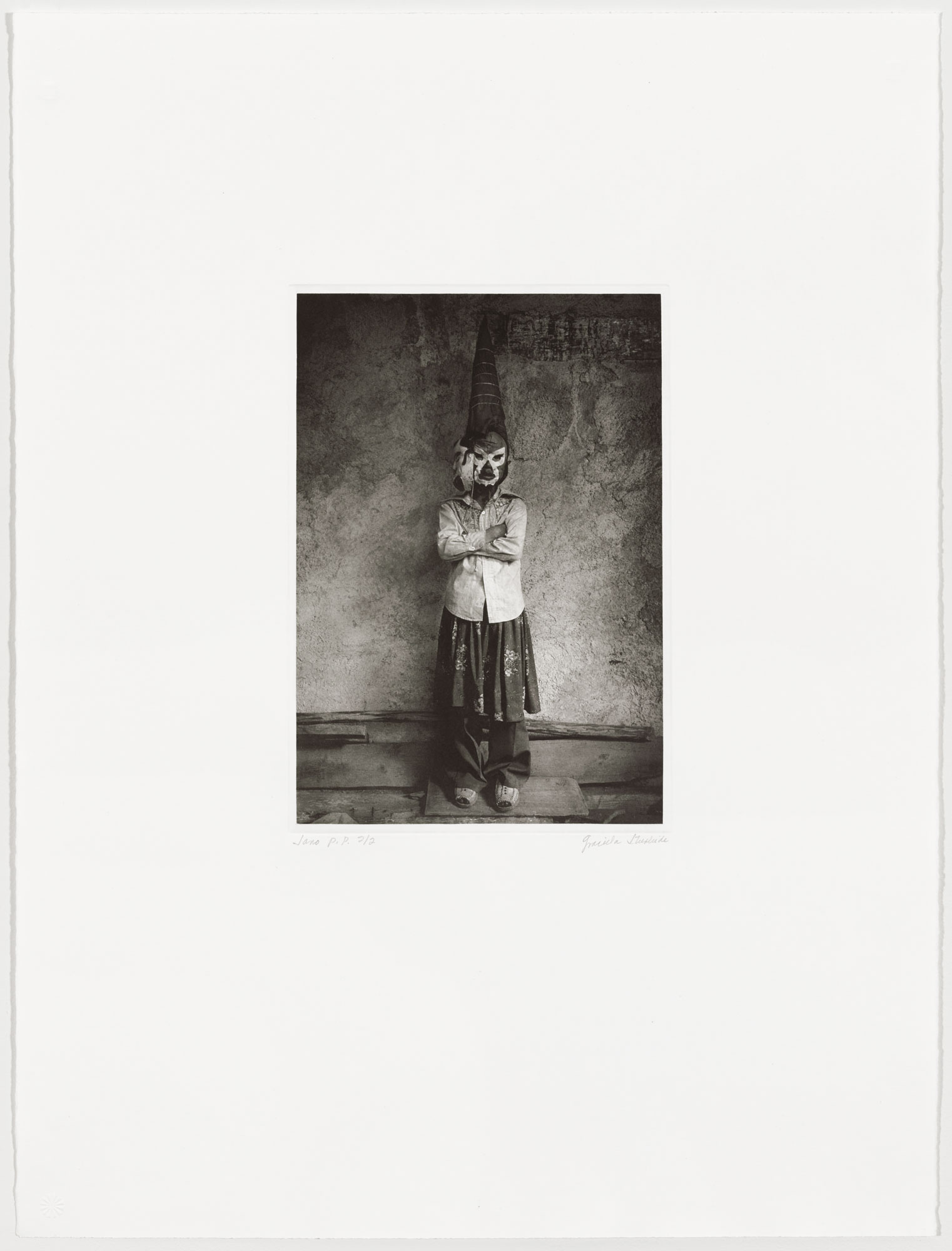
Graciela Iturbide
Jano, 1996
photogravure
29-7/8 x 25-1/8 in.
Published by Graphicstudio, University of South Florida Collection
http://graphicstudio.usf.edu/GS/artists/iturbide_graciela/iturbide.html
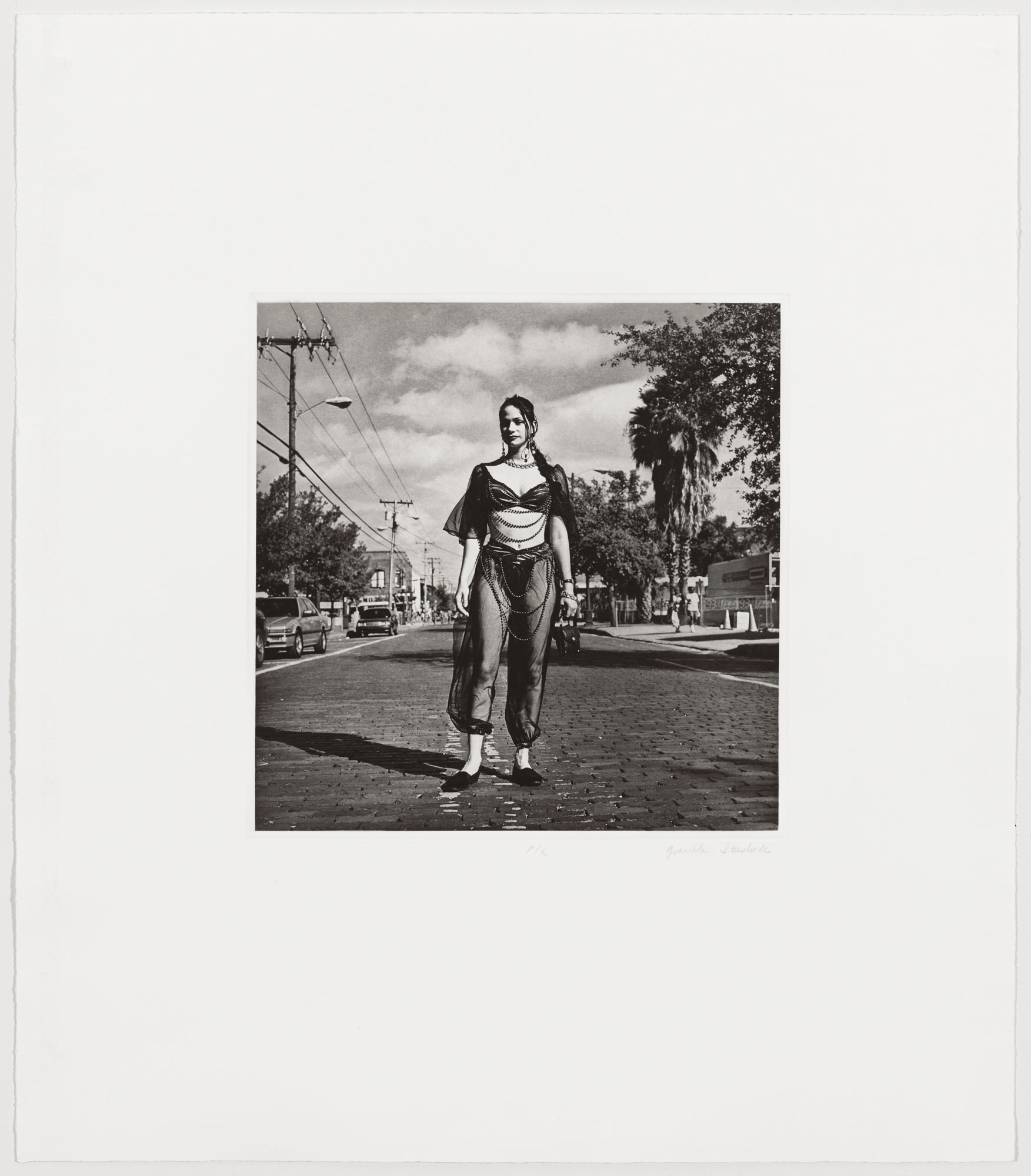
Graciela Iturbide
Janet, 1997
photogravure
30 x 26 in.
Published by Graphicstudio, University of South Florida Collection
http://graphicstudio.usf.edu/GS/artists/iturbide_graciela/iturbide.html
Manuel Carrillo documented the indigenous culture of Mexico through informal portraits and depictions of everyday activities. He embraced the ideas of Mexicanidad, a cultural movement that strove to substantiate a national identity by purging colonial and any other foreign influence from current art.
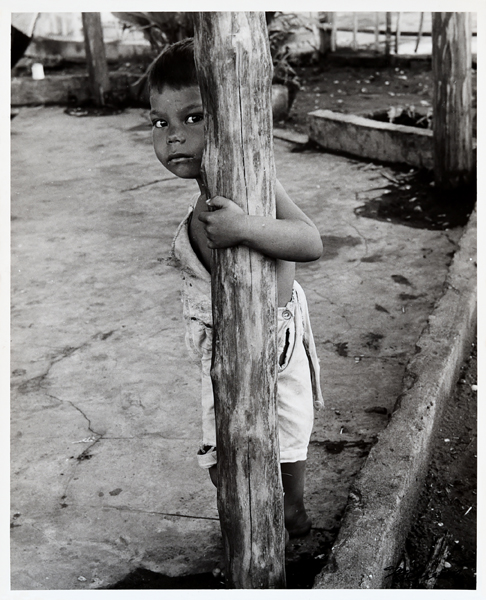
Manuel Carrillo
Fotographias de Mexico, 1960
portfolio of 26 gelatin silver prints
variable dimensions ranging from 8 x 10 in. to 14 x 16 in.
Gift of Alvin J. Gilbert, University of South Florida Collection
http://cam.usf.edu/CAM/cam_collection.html
[enter Carrillo in the quick search window]
Additional images of BIPOC individuals (by non-BIPOC artists or artists not of the same race or community as the subject depicted) that could be used in discussions of representation and its complexities:
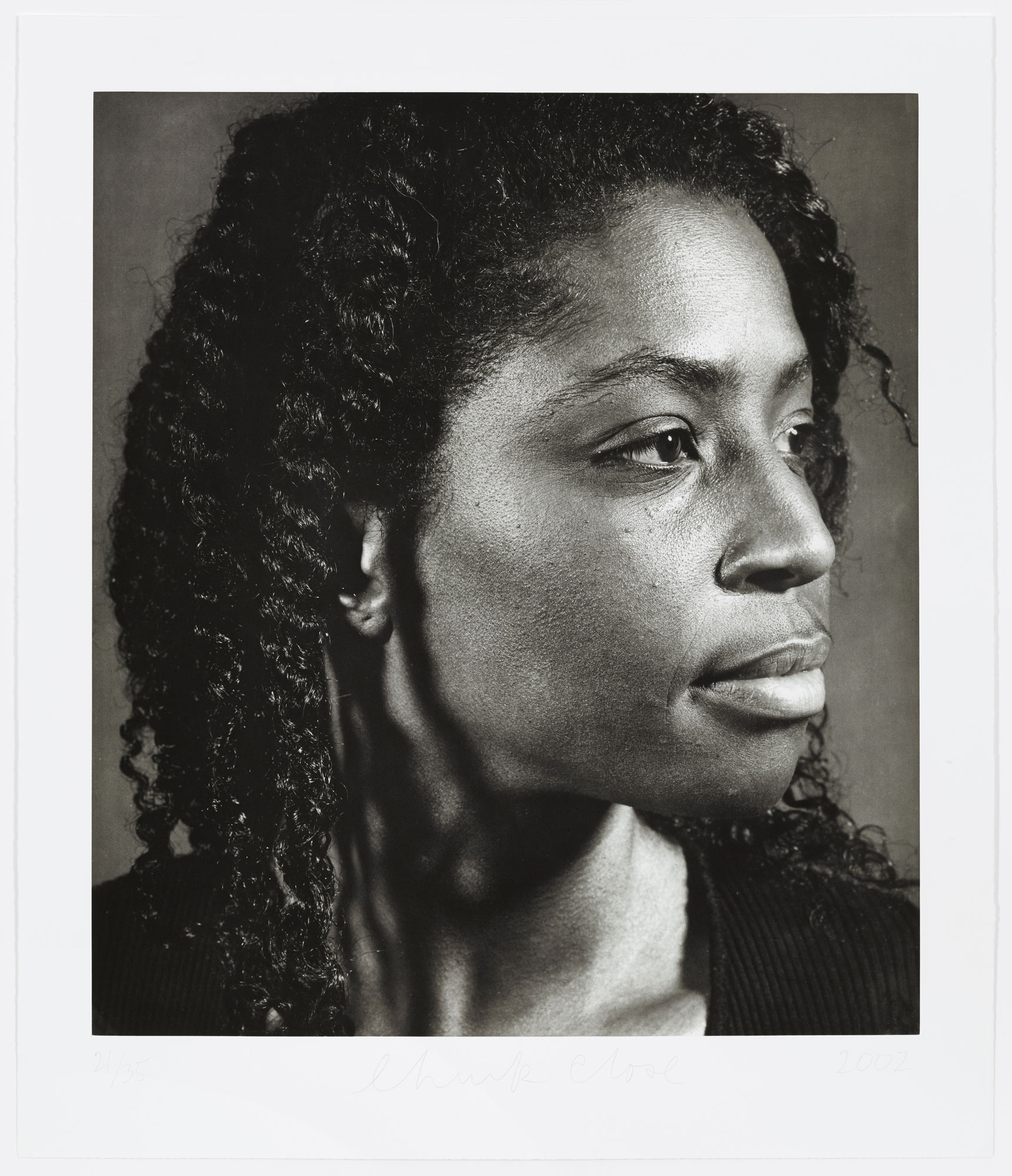
Chuck Close
Lorna, 2002
photogravure
46-1/2 x 40-1/2 in.
Published by Graphicstudio, University of South Florida Collection
http://graphicstudio.usf.edu/GS/artists/close_chuck/close.htmlImage of the artist Lorna Simpson
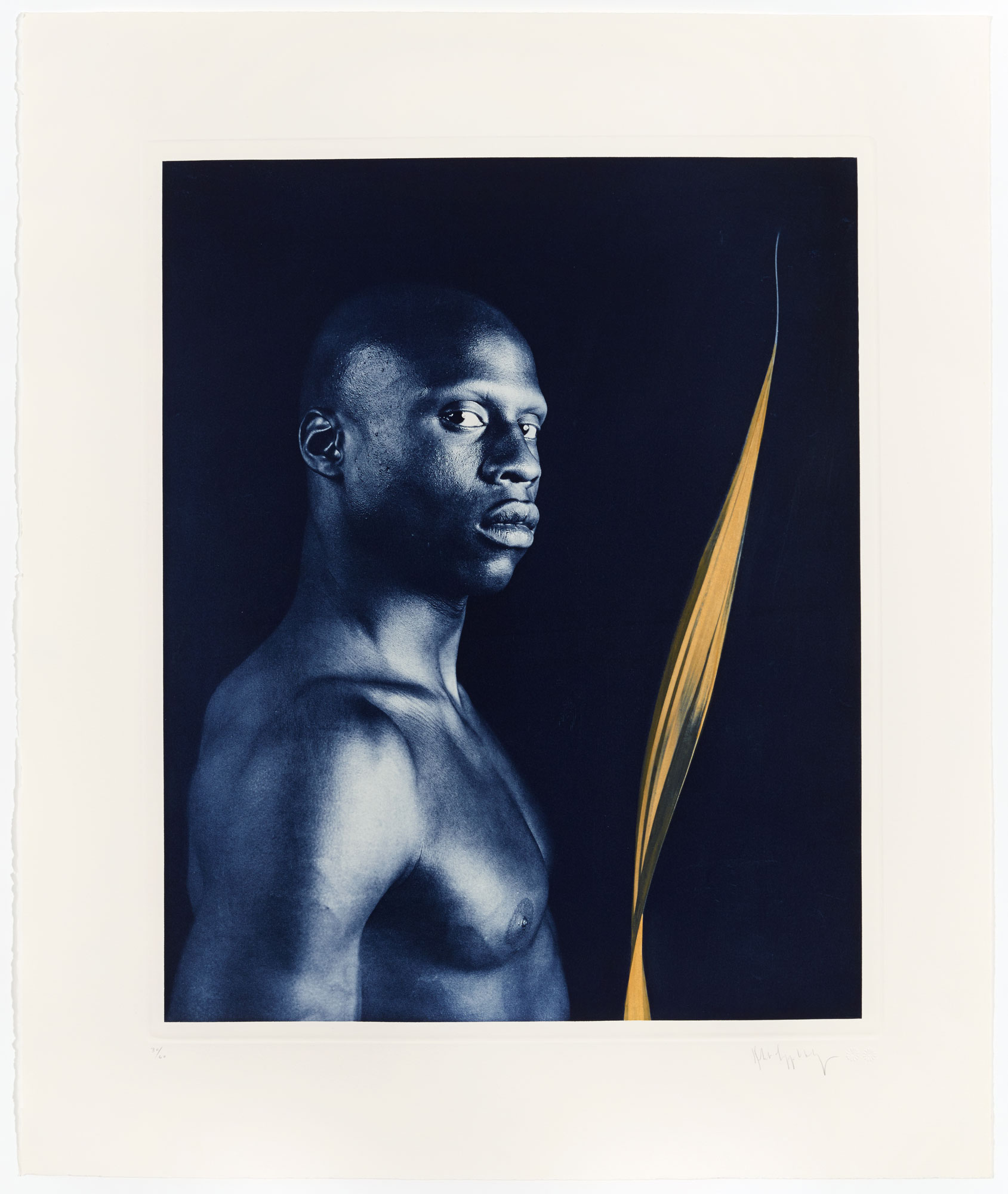
Robert Mapplethorpe
Ken Moody Portfolio, 1985
5 photogravures with watercolor and flocking
30 x 24-3/4 in.
Published by Graphicstudio, University of South Florida Collection
http://graphicstudio.usf.edu/GS/artists/mapplethorpe_robert/mapplethorpe.htmlImages of the model Ken Moody
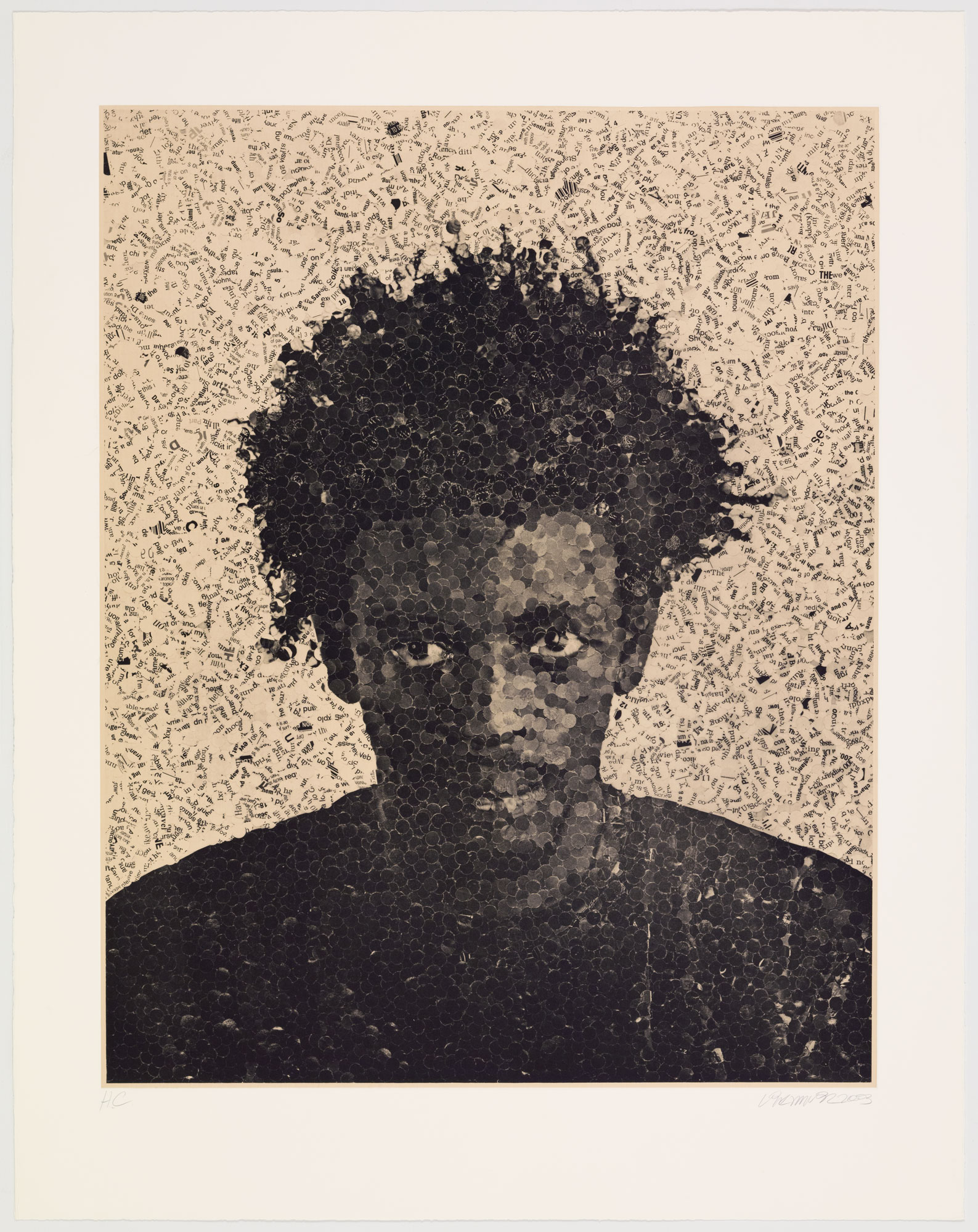
Vik Muniz
Jorge, 2003
photogravure on silk collé
52-1/4 x 41-1/2 in.
Published by Graphicstudio, University of South Florida Collection
http://graphicstudio.usf.edu/GS/artists/muniz_vik/muniz.htmlImage of Brazilian musician Seu Jorge
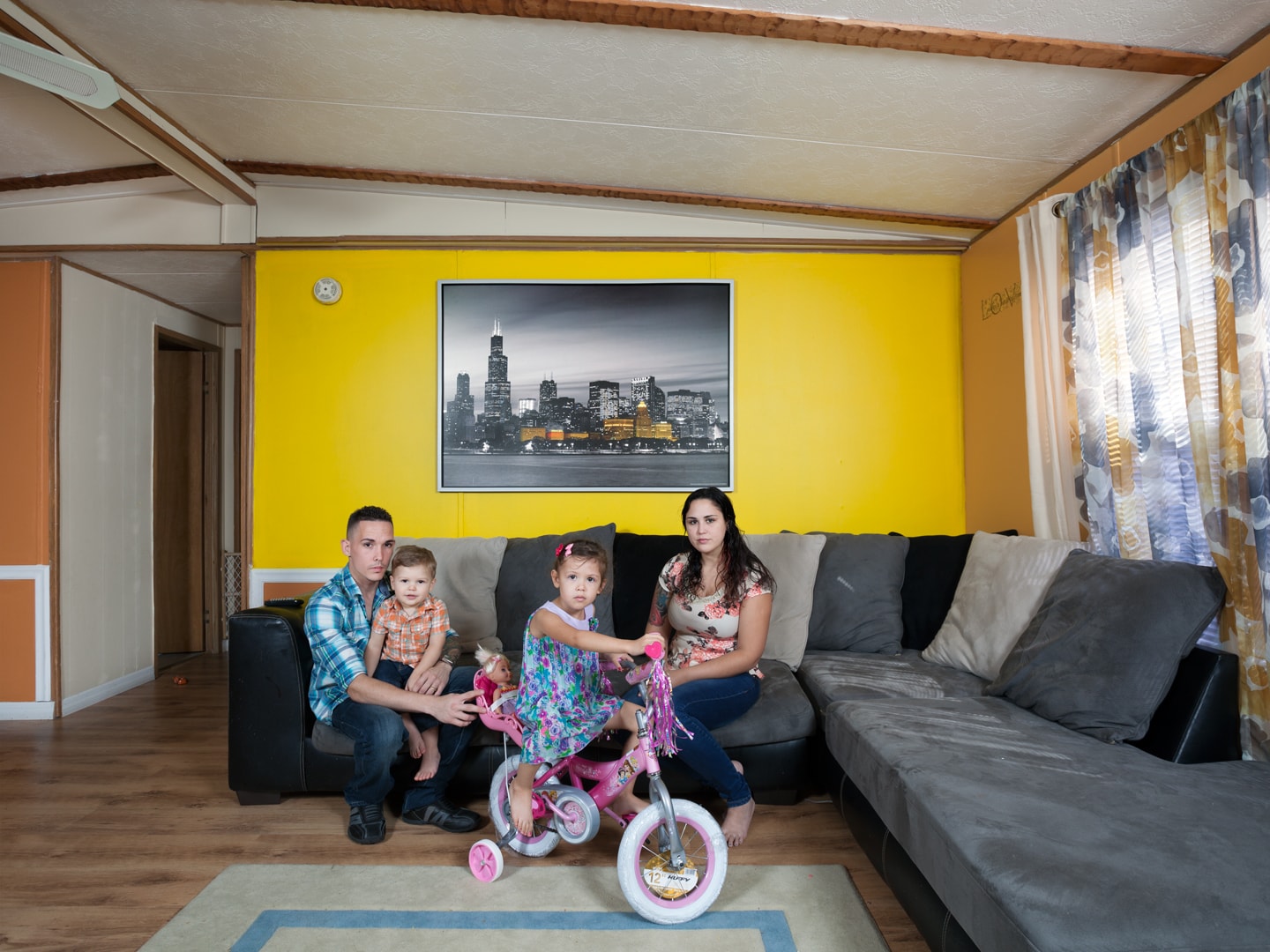
Corine Vermeulen
Gonzales Family, From the series Elsewhere (Suitcase City), 2015
pigment print
20 x 26-11/16 in.
Work created during a three-month residency in the University Community Area.
https://usfcam.wordpress.com/2015/12/11/telling-a-story-corine-vermeulen-photographs-the-university-area/
https://corinevermeulen.com/Elsewhere-Suitcase-City
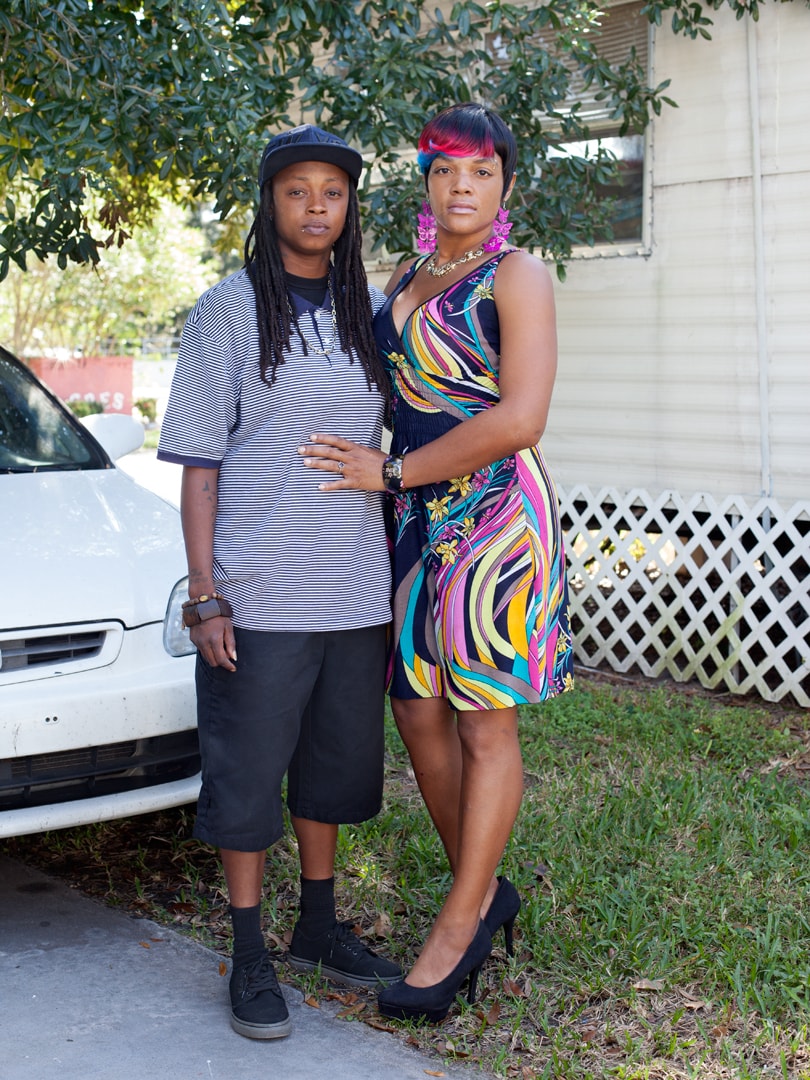
Corine Vermeulen
Davina and Monique, From the series Elsewhere (Suitcase City), 2015
pigment print
26-11/16 x 20 in.
Work created during a three-month residency in the University Community Area.
https://usfcam.wordpress.com/2015/12/11/telling-a-story-corine-vermeulen-photographs-the-university-area/
https://corinevermeulen.com/Elsewhere-Suitcase-City
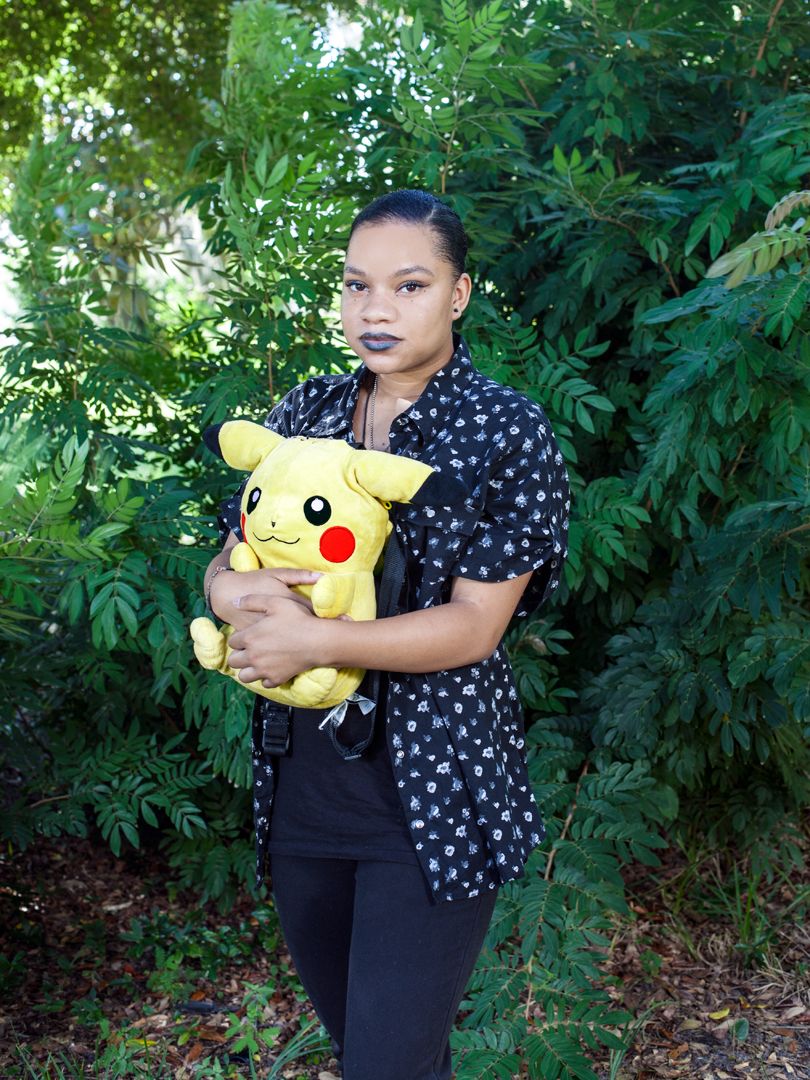
Corine Vermeulen
Daisa, From the series Elsewhere (Suitcase City), 2015
pigment print
26-11/16 x 20 in.
Work created during a three-month residency in the University Community Area.
https://usfcam.wordpress.com/2015/12/11/telling-a-story-corine-vermeulen-photographs-the-university-area/
https://corinevermeulen.com/Elsewhere-Suitcase-City
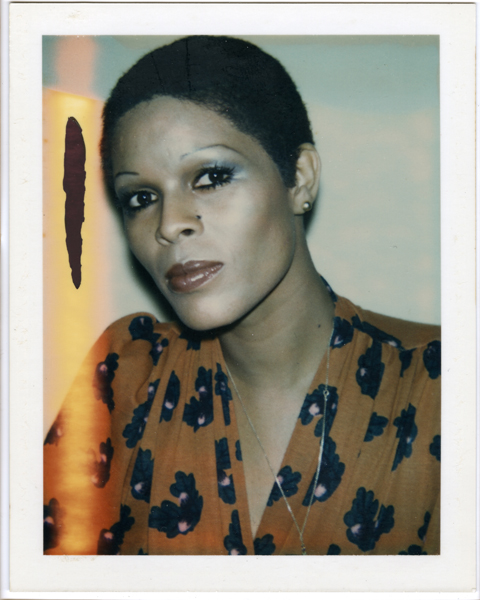
Andy Warhol
Ladies and Gentlemen (Orange Dress), 1974
Polacolor Type 108
4-1/4 x 3 3/8 in.
Gift of the Andy Warhol Foundation for the Visual Arts, Inc. The Andy Warhol Photographic Legacy Program, University of South Florida Collection
http://cam.usf.edu/CAM/cam_collection.html
[enter Ladies and Gentlemen in the quick search window]Polaroid taken as source material for the Ladies and Gentlemen series, 1975 depicting Black and Latinx drag queens.
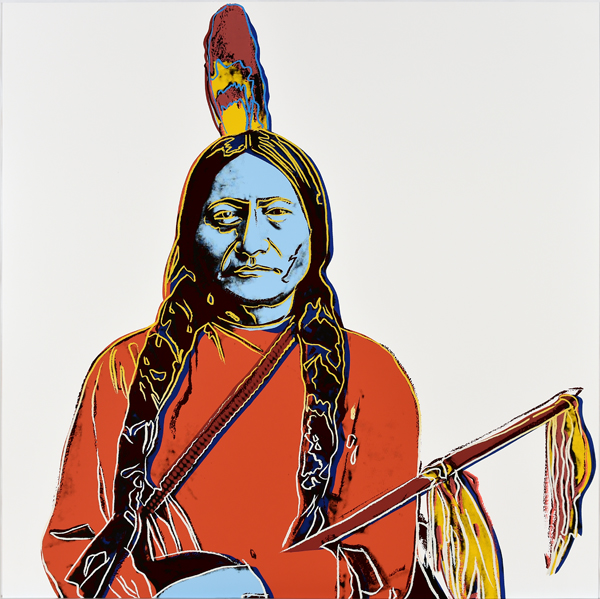
Andy Warhol
Sitting Bull, 1986
screenprint on Lenox Museum Board
36 x 36 in.
Extra, out of the edition. Designated for research and educational purposes only. Gift of the Andy Warhol Foundation for the Visual Arts, Inc., University of South Florida Collection
http://cam.usf.edu/CAM/cam_collection.html
[enter Sitting Bull in the quick search window]Printed for but not included in the finalized series Cowboys and Indians, 1986 depicting mythological, pop culture, and historical individuals and objects.
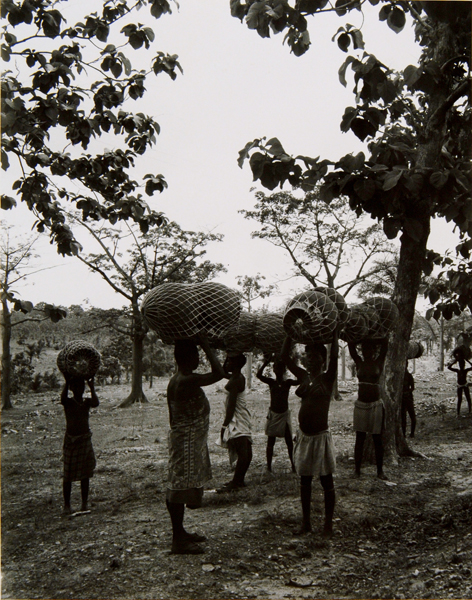
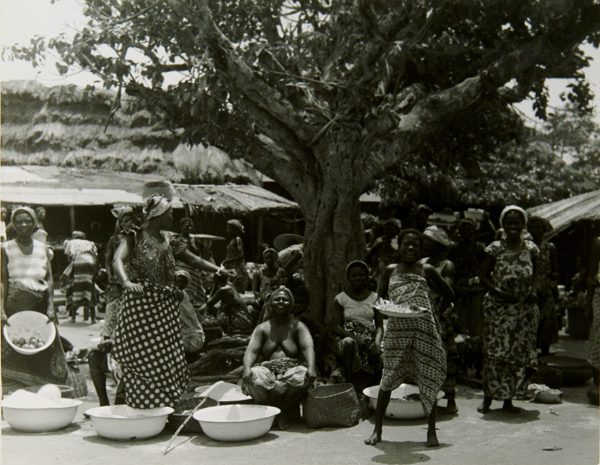
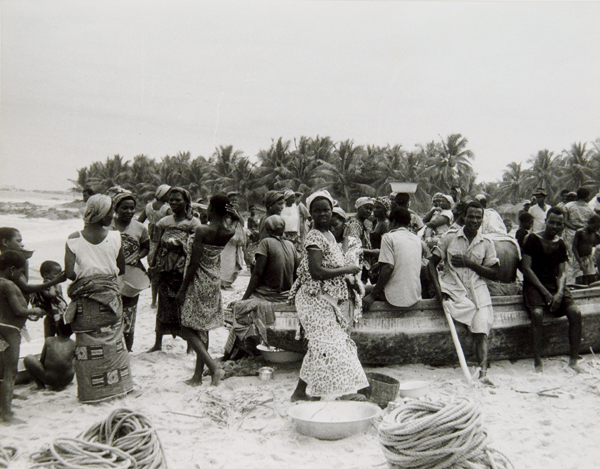
Todd Webb
Northern Togoland, 1958
Togoland, Marret, 1958
Togoland, 1958
gelatin silver prints
ranging from 10 3/8 x 12 ¾ to 13 7/8 x 11 in.
Gift of the Martin S. Ackerman Foundation, University of South Florida Collection
http://cam.usf.edu/CAM/cam_collection.html
[enter Togoland in the quick search window]The artist was commissioned by the United Nations to document people in their communities in Africa.
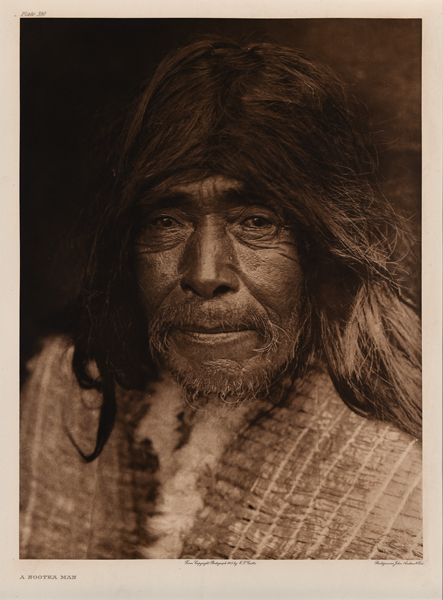
Edward Sheriff Curtis
35 photogravures
ranging from 1906-1928
ranging from 4-3/4 x 7-1/4 in. to 11-1/2 x 15-1/4 in.
Gift of Joseph M. Bearson, University of South Florida Collection
http://cam.usf.edu/CAM/cam_collection.html
[enter Curtis in the quick search window]
https://www.smithsonianmag.com/history/edward-curtis-epic-project-to-photograph-native-americans-162523282/
For more information about CAM’s antiracist work, please contact Noel Smith, Deputy Director, at nsmith@usf.edu or 813-974-5866
Donate!
Donate now to support our exhibitions and related educational programs!
USFCAM Mailing List
Email sign up for USF Contemporary Art Museum updates!
Upcoming Events
Visit the events page to see all our upcoming public programs.
Video Archive
Please visit our YouTube channel and subscribe! Explore hundreds of hours of past artist talks, conversations, sympoia, performances and more.
Contact
If you have questions or would like to learn more about our education programs, please email Curator of Education Leslie Elsasser.
Copyright + Reproduction
The electronic images and information available on this site are subject to copyright and may be covered by other restrictions as well. The images are made available to the general public as a representation of USF Contemporary Art Museum’s programs. Copy or redistribution in any manner for commercial use is not permitted. Anyone wishing to use any of these images for commercial use, publication, or for any purpose other than personal fair use must first request and receive prior written permission from the University of South Florida Institute for Research in Art. Please contact USFCAM at (813) 974-4133 for more information.